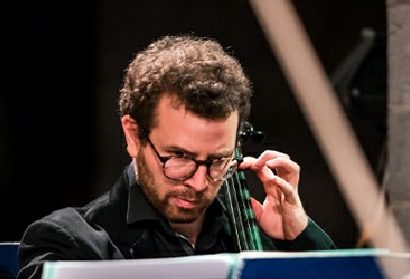David Truslove travelled to the Powys/Herefordshire border to immerse himself in the Presteigne Festival 2019, which promises to be a tonic for those seeking musical nourishment and artistic discovery.
The six-day feast of artistic events that is the Presteigne Festival 2019 (22-27 August) once again transforms this rural idyll from quiet border town to cultural hotbed thanks to the enterprising vision of George Vass its Artistic Director. Now in its thirty-seventh year, the Presteigne Festival 2019 continues to explore contemporary music showcasing new work from, amongst others, Harriet Grainger, Mark David Boden and Cheryl Frances-Hoad, alongside this year’s American theme drawing on music by native composers (Barber, Copland and Gershwin etc) and music written in the States (including Britten, Bartók and Stravinsky).
The first of two contrasting concerts I heard on Day Five was a ‘tasting menu’ for piano and percussion. This was music from established and up-and-coming composers given by the GBSR Duo; George Barton (percussion) and Siwan Rhys (piano). Seven items one after the other might have been lost in a blur of banging and crashing, but each work’s individuality made a singular impact such was the variety of conception and material. Only Steve Reich’s Clapping Music failed to excite me despite its memorised performance. (Surely by now it’s a piece to perform rather than listen to.) There was some kinship however with a fellow American Hannah Lash whose C belonged to Reich’s mode of additive processes, insistent rhythms from piano and vibraphone producing an engagingly hypnotic effect.
Nothing could have been further from its perpetual motion than Liam Mattison’s ADULTHOOD – a Presteigne Festival/Philharmonic Society Alan Horne Memorial commission – receiving its world premiere. Drawn from “the re-contextualisation of childhood fantasies and memories” and half-remembrances of student experiences, its gentle sonorities and tinkling meanderings unfolded with charm and precision. It was with Gregory Rose’s Boudica (also being premiered) that Barton showed his percussion playing prowess in a ‘bells and whistles’ work evoking the brutal humiliation of the ancient Celtic queen. A veritable battery of percussion was pressed into service for this strenuous workout, arresting to hear and watch in equal measure.
Arguably, one of the boldest scores of the afternoon was Luke Bedford’s Faraway Canons for bass drum and piano. Its gradually intensifying knocks and thuds formed a climatic soundtrack to the piano’s unbroken canonic procedures. Physical procedures associated with wave patterns was the stimulus behind Mark David Boden’s energetic Soliton, but it was Joe Duddell’s scintillating Parallel Lines that sustained my attention with its ten-minute assault course for the tireless Barton and Rhys.
An hour or so later at St Mary’s Pembridge the Presteigne Festival Chamber Choir under its conductor Philip Sunderland brought with it more sustained sounds in an hour-long slot of a cappella items and music for solo cello. Dubbed “O Magnum Mysterium”, the programme included three settings of the familiar Christmas text; the now ubiquitous one by Morten Lauridsen and those by William Byrd and Ola Gjeilo. A shame not to have heard one of the sumptuous double choir settings from either Giovanni Gabrieli or Alessandro Scarlatti, or one from Francis Poulenc or Pierre Villette. Any of those would have brought a welcome change of sonority or harmonic palette to what was a well-conceived theme celebrating the birth of Jesus yet sung with sepia-coloured tone and only periodic fervour.
Blend and balance were uniformly excellent, but cumulative energy was missing in the Byrd and Lauridsen, and the Gjeilo (with cello) sedated with its sugar-coated gloss. Warmth of tone (if not lustrous) arrived in James MacMillan’s O Radiant Dawn, so too in Richard Rodney Bennett What Sweeter Music but inflexible tempi deprived the performances of momentum. I enjoyed the warm embrace of Cecilia McDowall’s I know that my redeemer liveth and Frances Hoad’s uplifting O come, let us sing unto the Lord – energised and well-shaped accounts that are well worth a second hearing.
Between these items Alice Neary brought distinguished playing in two rarely heard works. George Crumb’s Sonata for solo cello (1955) traverses free-wheeling improvisation, variation form and a barnstorming toccata, the whole providing Neary an opportunity to demonstrate an impeccable technique. She impressed too in richly expressive playing in Imogen Holst’s autumnal The Fall of the Leaf – a set of three short studies for solo cello on a 16th century tune. Eloquent pizzicato and ardent passagework in two fast variations vividly brought to life gusts of wind buffeting the trees, while she reached deep into the work’s heartbreak for the central Adagio. Altogether, a programme of mixed attractions with some standout performances.
David Truslove is a regular contributor to Wales Arts Review’s music section.











